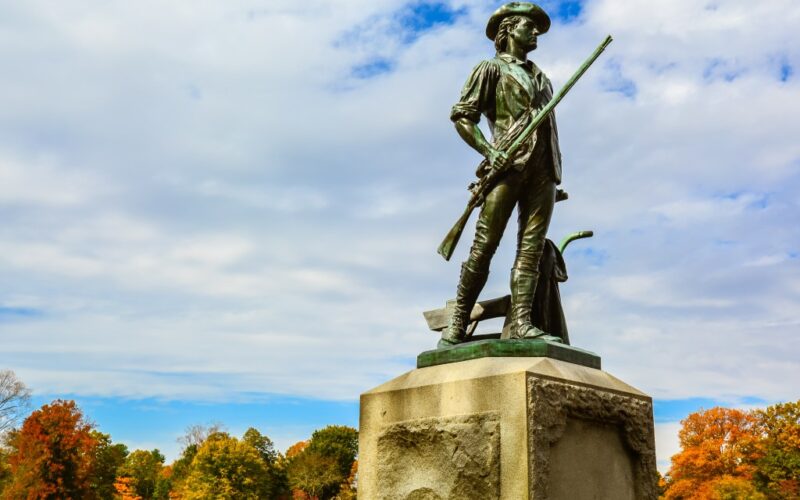Exactly 250 years ago today, ragtag Patriot militias engaged British Army regulars at Lexington and Concord in what would become the first battle of the Revolutionary War, one against the tyranny of a single authority wantonly imposing his will on the public. The eternal goals of that Revolution continue today.
That project, their project, is in peril now and it will take equivalent courage now to safeguard it. We all know it. Alaska Sen. Lisa Murkowski, a member of Abraham Lincoln’s party, saying candidly “we are all afraid… we are in a time and a place where I certainly have not been here before. And I’ll tell ya, I’m oftentimes very anxious myself about using my voice, because retaliation is real.”
She was referring to the political movement led by Donald Trump, the man who currently sits atop her own Republican Party and is wielding the awesome power of the presidency to target just those rights that matter most.
It was clear from Jan. 6 that Trump would stop at nothing to consolidate his own power. With the failure to truly hold him accountable for that, the once-again president has attempted to force universities and law firms to toe a political line, going to war with institutions like Harvard by threatening funding, nonprofit status and student visas; individual students have been detained for speaking out.
Most acutely, Trump has asserted a right to have agents grab people off the street and whisk them away to foreign gulags on cursory evidence they have no opportunity to contest. In the case of Kilmar Abrego García, a Maryland man with legal protections illegally sent to the CECOT mega-prison in El Salvador, the president and his Justice Department have repeatedly ignored Maryland Federal Judge Paula Xinis’ order — reaffirmed 9-0 by the Supreme Court — to take steps to facilitate his return.
But the courts are saying no and are not afraid, showing the spirit of those long-ago minutemen.
A conservative Reagan-appointed federal appeals judge, Harvie Wilkinson, writing for the unanimous three-judge panel, issued a relatively short order denying the government’s motion to stay Xinis’ orders and, importantly, laying out the stakes in plain terms. The government’s assertion that it can send U.S. residents to foreign prisons without due process and refuse to bring them back “should be shocking not only to judges, but to the intuitive sense of liberty that Americans far removed from courthouses still hold dear,” Wilkinson wrote.
Wilkinson acknowledged the sensitivities involved in these binational negotiations, but pointed out that the Supreme Court’s 9-0 ruling ordering the administration to follow Xinis’ directives to facilitate Abrego García’s return does not “allow the government to do essentially nothing.” And the judge asked the natural and obvious next question if the administration were to be allowed to steamroll due process in this way: “what assurance will there be tomorrow that it will not deport American citizens and then disclaim responsibility to bring them home?”
He continued: “The government asserts that Abrego García is a terrorist and a member of MS-13. Perhaps, but perhaps not. Regardless, he is still entitled to due process.” There’s that phrase, “due process,” which means that the president, or the king, can’t just do what he wants to the common person. There are rules. There are rights. And without those rules and those rights, there is tyranny, be it in the Boston of 1775 or in the America of 2025.
Then it was Massachusetts minutemen, farmers and merchants, facing down professional European soldiers at the Lexington town green and at Concord’s Old North Bridge who didn’t know that their muskets’ volley would be what Emerson called the “shot heard round the world.” Now it is ordinary Americans who must refuse to bend to bullying from the Oval Office and the issuance of dubious executive orders.
Trump and his aides laugh at and mock the courts. But the courts, the independent guarantors of our liberty and justice mean serious business. Beyond Abrego García, that is what is about, the fate of this experiment launched 250 years ago through the blood and sweat of the first Americans.
If it really turns out to be the case that an unconstrained president gets to strenuously punish people and institutions for disfavored speech, threaten the other branches into submission, remake the federal bureaucracy in his image while ignoring statutory bounds and have people grabbed off the street and renditioned to a foreign detention camp without due process, then the experiment failed. The sacrifices of generations of Americans will have been cast aside, and for what? So a group of oligarchs can get richer?
The Revolutionary War that started on this date was a very lengthy one. It took the Continental Congress another 15 months, until July 1776, to adopt the Declaration of Independence; the war would drag on for another seven grueling years before the surrender of the British at Yorktown to Gen. George Washington. Reread Jefferson’s words in the Declaration of all the rights that King George III had denied his American subjects and forced them to break from the mother country.
Our struggles to preserve those freedoms may also take a long time, but the objective remains the same from that first day when American troops died in service of a nation that was to take shape as a representative democracy, enshrined for itself a number of simple but fundamental rights: free expression, self-determination, balanced powers and due process, among others.
Complacency, cowardice and meek self-preservation won’t do here and now. The sacrifices made in 1775 and beyond demand otherwise. Our civic and government institutions must recognize that we are not just acting on our own behalf but are stewards of a legacy that is at real risk of being lost. Yes, Sen. Murkowski, there is cause to be afraid. But in establishing a united pro-democracy front, there is also cause for hope.
In these last 250 years, our country has made many grievous errors, starting with slavery, which would require a bloody Civil War to end. But the intervening two-and-a-half centuries, it has often moved haltingly to live up to these ideals, but people never stopped striving towards them, very often going against the grain of public opinion and while facing significant danger.
Wilkinson concluded: “It is, as we have noted, all too possible to see in this case an incipient crisis, but it may present an opportunity as well. We yet cling to the hope that it is not naïve to believe our good brethren in the Executive Branch perceive the rule of law as vital to the American ethos. This case presents their unique chance to vindicate that value and to summon the best that is within us while there is still time.”
While there is still time. All presidents lose and win in the courts and before Trump, all had accepted their losses. Our 250 years of self-government under law demands that he give way to the courts.








